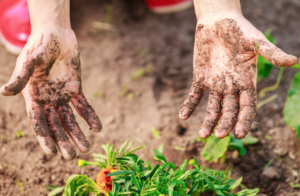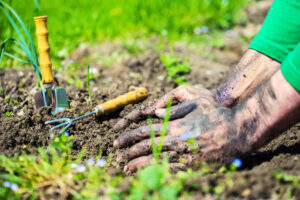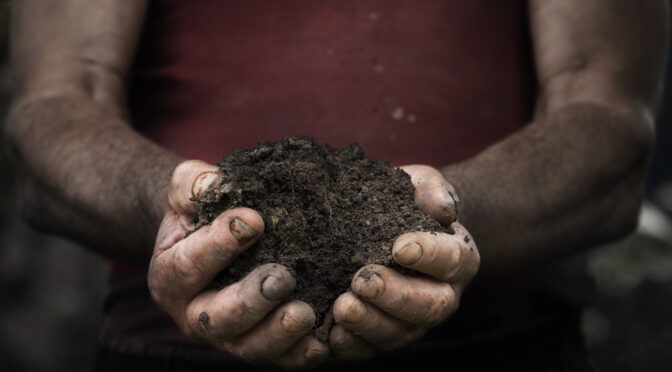Gardening enthusiasts adamantly tout the long list of benefits include stress reduction and mood improvement. But, why stop there? Could tending to a garden, breathing in fresh air and exposure to Vitamin D sunshine rays help those suffering with depression? The votes are in and experts say “yes.”
The answer lies in the actual antidepressant microorganisms in the soil.
Antidepressant Microbes in the Soil
Mycobacterium vaccae (M. vaccae) in dirt and soil naturally activate the release of serotonin and dopamine in the brain.
Together, these neurotransmitters send chemical messages to the brain: dopamine affects your emotions via sensations of pleasure and pain, while serotonin regulates our mood, social behavior, libido, memory and sleep.

When gardening, these microorganisms absorb into your skin and are inhaled with each breath. Upon entering your bloodstream and respiratory system, they quickly get to work – boosting your mood and subsiding your pain.
According to O’Brien, not only did the vaccae microbial bacteria improve their immune system, but patients also demonstrated a sizeable boost in their happiness, vitality and pain relief.
Study: Soil Organisms and Performed Behaviour
According to a study conducted by neuroscientists Dorothy Matthews and Susan Jenks, published in the Behavioural Processes Journal, “eating, touching and breathing a soil organism may be tied to the development of our immune system and nervous system.”
The research was conducted on mice, administered M. vaccae and put through a series of behavioral tests. Not only were the mice less anxious, but they also demonstrated boosted cognitive functioning – navigating a maze twice as fast as their placebo counterparts who weren’t administered any microorganism.
According to Matthews, these findings lay the foundation for human adolescent schooling practices, “it is interesting to speculate that creating learning environments in schools that include time outdoors where M. vaccae is present may decrease anxiety and improve the ability to learn new tasks.”

Professor Graham Rook at the University College London has weighed in on the issue. Rook points to the gastrointestinal tract, the home to a hundred trillion microbes at any given time.
These bacteria are a product of both genetics and lifestyle, interacting with our entire body, from our lungs to our gut. Deficiencies in microbial exposure, Rook argues, is the link between the rise in chronic health problems, including both autoimmunity deficiencies and depression.
This brain-gut connection proves to be the bridge between gardening and mental health.
Get Dirty: Gardening for your Brain
The long-held benefits of gardening, as proven here, are true. Not only is gardening an exceptional activity to incorporate into your daily routine, but the release of happy neurotransmitters are undeniable.
From the soil brain-boosting benefits to the grounding effects of nature, getting down and dirty by tending to a garden proves to be a worthy investment in your mental wellbeing.
What are you waiting for? Start a garden, get outside, enjoy nature and get dirty.
SOURCES
http://upliftconnect.com/science-finds-soil-help-depression/
http://www.apa.org/monitor/2012/09/gut-feeling.aspx
http://www.economist.com/node/8956457
http://upliftconnect.com/brain-on-serotonin/
http://www.grahamrook.net/page5/greenspace.html

